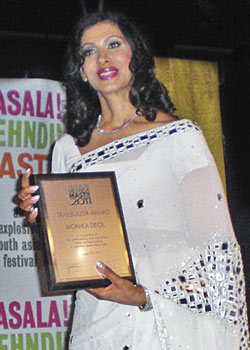Greater Toronto

(William Doyle-Marshall pix)
By William Doyle-Marshall
Food, music and beautiful women were integral to Masala! Mehndi! Masti! 2011 co-presented by Satya Arts and Harbourfront Center, pegged as North America's largest free South Asian Festival which celebrated its tenth anniversary over the weekend.
Abhishek Mathur, festival director termed it "amazing" having started very small at Harbourfront.
Reflecting on the beginning of this festival he recalled "I am an immigrant and my culture shock was my community because when I came here in 1989 everybody used to ask me 'so what's your caste, what's your religion? I mean every Indian or South Asian person. Growing up in India I had never been asked. Nobody asked me what my religion was, what my caste was because nobody cared. Maybe I had a very, very special life that it didn't matter."
It took a lot of constant questioning of his identity after arriving in Canada where he thought everybody was the same, everybody was equal, nobody cared where you are from; as it's a melting pot, multiculturalism and all that jazz.
"Boy was I mistaken within my community," Mathur recalled. As a result of that experience which really hurt him, Abhishek got involved with the Indian Students Association on campus at York University. He started teaching his language to his peers. The young Indian student wanted everyone to celebrate religious festivals not to perpetuate religion or organized religion but to share each other's celebrations. That evolved into a desire to do a festival that's mainstream, downtown, accessible to everybody and free.
"Harbourfront was the model that my wife and I thought really work," he recalled.
About 15,000 attended the first event which showcased between 30 to 40 performances. The highest attendance was about 100,000. This year about 60 presentations and performances were made and that included music, dance, film, theatre, visual arts, cooking shows, social issues workshops, dance workshops and yoga. "Every year it's pretty much a brand new production. The festival really tries to push boundaries. We go where no South Asians dared go. A lot of what we do is participatory," the founder and director was confident.
The festival offered great fusion works like South Asian Hip Hop, Bhangra, Indo Caribbean artists, S.W. Storm performing chutney soca with a mix of Bollywood on the stage and carnival style dancing.
"We are all-encompassing, we are inclusive and it's a real sense of pride to be back at Harbourfront and these guys have taught us what we know," the director admitted.
An incredible 16 member chamber choir from Shillong, North Eastern India flew in just for the event. They are the 2010 winners of India's Got Talent contest. Abhay Deol a major Bollywood actor who does a lot of art house films and off beat films was here for screening of some of his films. A Hip Hop Group from Sri Lanka called the Kings of Hip Hop in Sri Lanka electrified the festival stage as well. Before coming here they performed with Indian legend Asha Bhosle last week in Colombo..
Through a Seniors Idol Contest, Mathur said they tried to give back the stage to the older community and basically show respect to the people who handed down their culture to the youth. In the long term he hopes MMM becomes redundant to the point where it's not required. The director visualized a time when everybody across the remaining cultures will look at incorporating some element of South Asian Culture in their daily lifestyles, whether it is music, food or dress, spirituality or some element from the South Asian influence.
"That makes it really mainstream," he smiled.
Prime Minister Stephen Harper and Ontario's Premier Dalton McGuinty sent congratulatory messages to festival organizers through emissaries like Mark Adler MP for York Center and Kathleen Wynn, minister of Transportation..
Festivals like MMM were created to give the younger generation the sense of ownership and responsibility to perpetuate sharing the culture, not just maintaining it within the community.